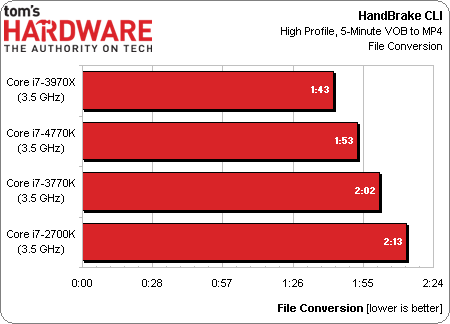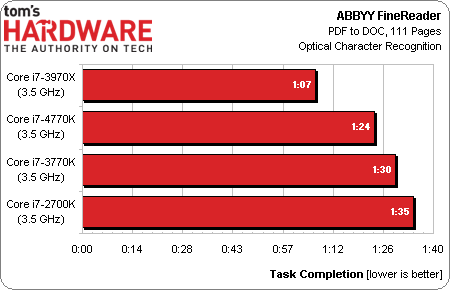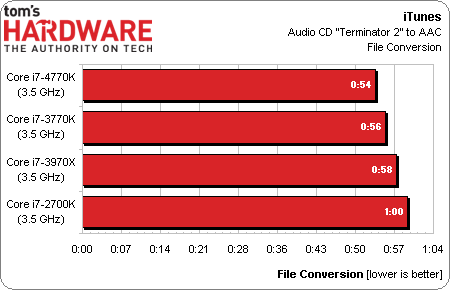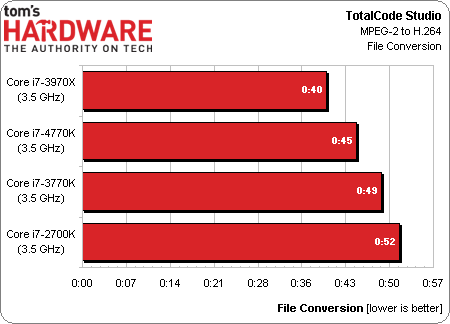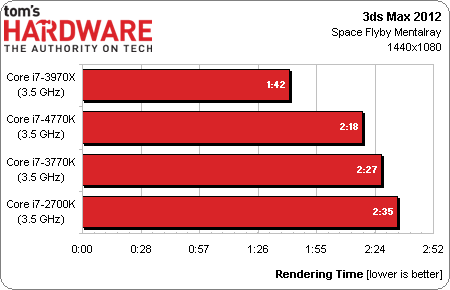Core i7-4770K: Haswell's Performance, Previewed
A recent trip got us access to an early sample of Intel’s upcoming Core i7-4770K. We compare its performance to Ivy Bridge- and Sandy Bridge-based processors, so you have some idea what to expect when Intel officially introduces its Haswell architecture.
Results: More Common Desktop Apps
The Core i7-4770K plants itself right between Intel's four-core Core i7-3770K and six-core -3970X.
More aggressive threading places Haswell ahead of Ivy Bridge in this OCR-based test, but quite a ways behind the flagship CPU representing Sandy Bridge-E.
Like LAME on the previous page, our iTunes benchmark is single-threaded. In this test, however, we're leaving Turbo Boost enabled. Higher IPC throughput pushes Core i7-4770K into a lead. The Sandy Bridge-E-based Core i7-3970X doesn't benefit from its six cores, and slides back to third place. It's only faster than the Core i7-2700K because of a higher single-core Turbo Boost frequency.
Haswell is certainly faster than Ivy and Sandy Bridge, but our Core i7-4770K cannot catch the Core i7-3970X in a benchmark able to utilize all processing resources.
Again, Core i7-3970X proves the viability of an older Sandy Bridge-E configuration in threaded software. The more mainstream processors trail behind.
Get Tom's Hardware's best news and in-depth reviews, straight to your inbox.
Current page: Results: More Common Desktop Apps
Prev Page Results: Performance Teaser, Per-Clock Perf And Threaded Apps Next Page Results: HD Graphics 4600 In Hitman And DiRT-
twelve25 Obviously with AMD striggling, Intel has no need to really stretch here. This is another simple incremental upgrade. Good jump from socket 1156, but I doubt many 1155 owners will feel the need to buy a new motherboard for this.Reply -
EzioAs Thanks for the preview!Reply
So all of these results are what most people expected already: minimal increase in CPU performance while the iGPU shows significant increase? I'm not surprised really (and I believe most people have speculated this), since Haswell mostly targets the mobile segment.
@twelve25
In my opinion though, unless LGA1156 i5/i7 users really want to upgrade (native USB 3.0, more SATA 3, etc), they can still hold out with their current CPUs. Although upgrading to Haswell rather than IB does make much more sense if they really want to but there's also the reported USB 3.0 bug and we haven't seen the thermals and overclocking capability on this chip so it might actually be a turn off for some people. And yeah, I don't think many SB or IB users will upgrade to Haswell. -
dagamer34 @twelve25 But who does Intel really need to convince here? Trying to chase after people who upgrade every year is a fools errand because its such a small piece of the pie compared to the overall larger market. Besides, most of Intel's resources are clearly going towards making mobile chips better, where there energy really needs to be anyway.Reply -
dagamer34 To add to EzioAs's point, I don't see most people on SB/IVB systems upgrading until Intel makes chips that have a good 10-15% better performance than 4.2-4.5Ghz SB/IVB systems or they decide to go down the APU route like AMD is (and also find/create workloads which an APU would beat those systems). In other words, not for another 2+ years.Reply -
Adroid killerchickensDoes Haswell run hot as Ivy Bridge?That = the million dollar question. Did they do away with the bird poop and return to fluxless solder.Reply
Intel should stop throwing insults to the overclocking crowd. We will pay another 10$ for the fluxless solder. -
mayankleoboy1 @ Chris Angelini : Man, you are amazing for this preview! +1 to Toms.Reply
There is no surprise at Intel excluding TSX from the unlocked K parts. They removed teh VT-d in the Sb/IB too. Just so that people not use teh $300 chip in servers, but have to buy th e$2000 chip.
Intel are fucked up
i dont think Intel will be too happy with Toms for this preview.... -
sixdegree Good preview. I kinda hoped that Toms includes the power consumption figure for Haswell. It's the biggest selling point of Haswell, after all.Reply -
mayankleoboy1 sixdegreeGood preview. I kinda hoped that Toms includes the power consumption figure for Haswell. It's the biggest selling point of Haswell, after all.Reply
Power consumptions is a lot dependent on the BIOS optimizations, which are far from final.
